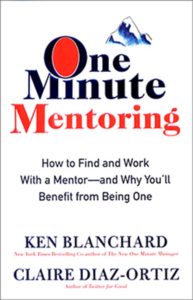Last week, I wrote a post that ruffled a few feathers.
Specifically, I argued that paying for a mentor can be a smart business move.
As I explained, many individuals these days pay for the mentoring they seek. It’s a simple business transaction that satisfies both parties: the mentee gets what he or she wants (quality mentorship), and the mentor has an incentive to agree to it.
In a recent post on mentoring over at AskAPRGirl, I said just as much:
Remember that paying for a mentor is not heresy. Indeed, many a fine coach or consultant offers a paid mentorship program to help get you to where you need to be. If an influencer really wants to help, but doesn’t have the bandwidth, why shouldn’t they offer such a service to fans they can support?
Some readers, apparently, didn’t like this one bit.
From the notes I received in response to the post, I heard that some readers believe that paying for mentorship “muddies the waters of a selfless exchange” (not my words), and “turns a relationship into a transaction”.
Although I understand this sentiment, I sure don’t agree.
And here are three reasons why.
Why You Should Pay for a Mentor:
- It’s Hard to Get Good, Free Mentors. If you want to pitch some influencer you’ve never met — say Seth Godin or Tim Ferriss — on the notion of sitting around with you for a couple hours each month brainstorming and strategizing about your challenges in life and work for the shiny price of totally free, more power to you. Is your quest unlikely? Yes. Do some succeed? Yes.
- Quality Mentorship is Better than Free Mentorship. I am confident that if I were to walk out onto the streets of San Francisco’s Tenderloin right now (or any urban or rural area where folks wander around aimlessly without much to do), I could find someone to sit and talk with me for free for an hour or two. Would that advice be useful? Maybe, or maybe not.
- Good Mentors Have Good Connections. When people seek mentors, they do so not only for the quality of advice that mentor will offer (and the wealth of experience they bring to that advice) but also for the connections that mentor might have. Connections are everything in business, and sometimes you need to pay for them. Better connections mean better mentors.
Have I convinced any more of you that paying for mentorship is NOT heresy? Or do you still get angry that I suggest it? Inquiring minds want to know…





I agree, I don’t think it’s heresy to suggest paying for a mentor. However, I would hope that someone would see that I’m a worthwhile investment to pour time and energy into without the obligation of monetary payment. While it may not be heresy, most twenty-somethings don’t have the resources to pay for this kind of relationship. (if we did, we likely wouldn’t be the mentee, no?)
Most true mentors should probably look for several (younger?) people and purposefully help them develop without charge. Someone they know who would be willing to pay if they could, but can’t. Their payment would be watching them develop and grow. Payment doesn’t have to be strictly limited to financial resources – there are many other fulfilling intangibles too!
Hi Claire – good post. We all have to invest to improve. We pay personal trainers for fitness, why not for professional mentors?
Sure, there are times when mentors will choose to invest in you by giving their time to you no charge. I do that for 1-2 people who I have taken a particular personal interest in seeing getting ahead, however, for a committed program over a specific period of time one should expect to be prepared to invest. I’ve paid for a mentor/coach for a specific period and it changed my life. One of the best investments I’ve ever made.
I couldn’t agree more with this post. That’s in fact why I created the site – mealswithmentors.com – because I never had a mentor. Due to this fact, I ran into a lot of difficulties in my life – all of which could have been avoided if I had a mentor. With our program, all you need to do is take a mentor out to lunch, and in exchange, you get advice in your desired topic.
Great article! I started a paralegal mentoring company, The Paralegal Manager, but soon found that the harsh reality is, we all have overhead and financial needs. In this day and age, it’s very difficult to do any job for free and that includes mentoring.
Thank you for this article!
Paid mentorship programs are valuable so long as they provide value. You could very well pay a self-professed “mentor” and then find out after payment that the “mentor” had no real value to contribute. The truth is that there are SO many coaches and gurus out there that it is VERY easy to lose money if the mentor/coach does not provide value as promised.
To me, a mentor is someone who has a vested interest in your success; and they do it because they recognize potential, and want to make a difference in the world by opening doors and opportunities for someone else. A coach–to me–is a paid professional that helps people overcome shortcomings that are holding them back from getting to the next level.
If a person is not lucky enough to have a mentor in their lives, then the next best choice is coaching; however, care must be taken to ensure that the coach is able to provide value as promised, and not take a person’s money only to provide no real value.
Caveat Emptor…let the buyer beware
I guess if you cant impress a mentor go hire a life/business coach. Just kind of a shame to see the connotations of mentorship get watered down to a business transaction.